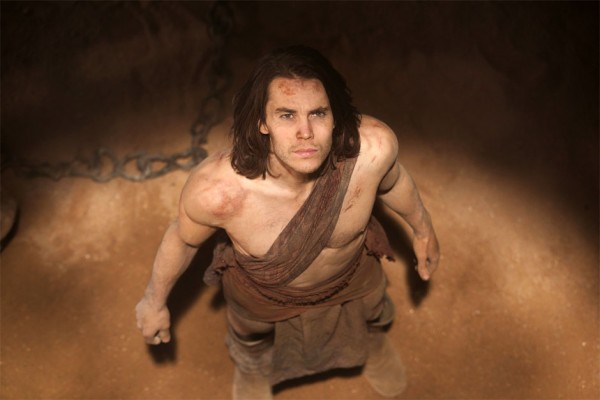Culture
The sad ballad of “John Carter”

Disney’s John Carter is among my favorite movies of 2012 so far. I feel like saying so as a relatively published film critic is akin to lighting a blunt in church, with respect to the canonized list of shit you just don’t do. Though the film has its defenders, however few, far more people are talking about what an unmitigated disaster it is, a big-budget flop that will live in infamy alongside Cutthroat Island and Waterworld as a quintessential example of what happens when a movie studio’s unbridled hubris comes back to bite it in the ass. There’s just one little problem: John Carter isn’t actually tanking. In fact, it’s doing pretty damned well and everybody needs to slow their roll for a minute.
Statistics time: John Carter has indeed flopped by U.S. box office standards. Relative to its estimated $250 million budget, so far it’s only pulled down $68 million and counting. At most, it’ll top out around $70 million in theaters before trying to recoup on DVD. What most people don’t realize, though, because evidently America = the whole world forever with respect to box office, is that Carter has also made over $200 million overseas and is currently placing high on several other countries’ box office charts. The domestic grosses combined with those worldwide paint a very different picture of Carter, one that suggests the film will at the very least break even. It won’t be the franchise-starting hit Disney probably wanted (a similar situation happened with Tron: Legacy, though that film was cheaper to make/market), but it’s by no standards a flop. Hell, while I’m on the apologia train, Waterworld was actually profitable when you include the worldwide grosses, and Cutthroat Island…nope, that one still tanked.
Now that I’ve proven with advanced statistical science that John Carter is not in fact the unmitigated flop that its current reputation would suggest, I’m moved to ask: Why do people hate it so much, and why does it feel like everybody wanted to? For one, I loved the film. I think it’s a genuinely fun, breathlessly imaginative throwback to not only Edgar Rice Burroughs’ original novel, but also 1950s pulp serials in print and onscreen alike. The film is the tale of a Civil War veteran (Taylor Kitsch, who has the best possible surname for the movies he’s been showing up in lately) who’s sent to Mars and becomes the unlikely leader of a rebellion against the evil red guard (the visual aesthetic owes a lot to the Fire Nation from Avatar: The Last Airbender, but done properly this time around), who threaten to colonize and oppress the whole of Mars. Also, gravity does not apply to John Carter, as his body is made for that of the Earth. This leads to a deliriously entertaining sequence early on, in which Carter takes a series of massive leaps around the barren deserts of Mars, flailing at first until he finds his feet. So, too, does the film; after a first 40 minutes or so weighed down by a great deal of necessary exposition, it becomes an unabashedly gleeful piece of big-ticket fantasy/sci-fi that director Andrew Stanton (of Pixar fame, most notably Ratatouille) milks for everything it’s worth.
One of the immediate conclusions I want to draw about America’s rejection of John Carter is that, at some point in the advertising process, it seemed like Disney got really embarrassed that they spent so much money on a fantasy film and started trying really (really) hard to hide it. Between the absurd Super Bowl ad, which says virtually nothing about the movie or anything that happens in it, and the title change from the far superior John Carter of Mars, it felt like there was a certain degree of battening down hatches, a prevailing feeling that the movie was a flop that in turn became a self-fulfilling prophecy before the thing even had a chance to come out and prove itself. It doesn’t help that staunch genre filmmaking usually doesn’t get the kind of budget that Carter got, so the pressure was on from the outset.
More than anything, though, I think we’re in a strange paradox as a moviegoing nation right now, wherein geek culture is being heavily fetishized, but within a rigid set of unspoken parameters. Superhero movies are in vogue, as are other arguably geeky properties, but only if they’re not too ostentatiously so. Both Green Lantern and Sucker Punch were high-profile flops last year, and even though neither of them were very good, there’s a certain suggestion that the superhero/cultish/otherwise outré properties have to have a certain aesthetic coolness to them (Chris Nolan’s Batman series) in order to be palatable on a mass level. John Carter not only didn’t have that, but was almost defiant in its world-building feel, one more akin to Star Wars than to the instant accessibility of, say, the Spider-Man films. John Carter may not reinvent the wheel, and sadly, it may not even get the chance to deepen its universe in a second go-around. If you’re interested, though, don’t let the hype fool you. Join the party, and the vocal few of us will be here waiting for you to see the light.
(Final note: Thanks are owed to Nico Lang for his help in shaping this piece.)